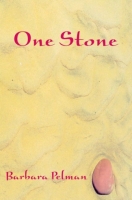
Review by Jenna Butler.
Barbara Pelman’s One Stone speaks quietly and eloquently of rebirth following the loss of a twenty-year marriage. At times wry, but never bitter, Pelman charts the circular course of love and loss using her family’s history as a touchstone.
What thrills me about this book is its quietude: the manner in which it delves deep without trumpeting about the journey; the way in which its quiet words reach a common ground in every reader. Pelman does not wax romantic about the breakdown of her marriage; as she says in “Journey,” “never mind the goodbyes / Close the door and go” (15).
The shattering of the marriage that grounds this collection is not an unexpected one. The reader gets the sense that the breakdown has been a long time coming, and that it has been partly an unwillingness to admit what is already felt that has caused both partners to continue to cling on. What makes this book extraordinary is that it does not attempt to move into the realm of rant; instead, it sings of the long inward journey following the loss of someone close, of the necessity of going back to one’s roots in the redefinition of self that follows.
It is in retrospect, Pelman seems to say, that we can see the hairline cracks in our personal histories before they shatter to pieces. Following the breakdown of her marriage, Pelman goes back to an old family photograph and recognizes that even then, she was in the process of leaving those she cared about:
If I pull the corners of my mouth
up, nobody will know.
If I move two more steps –
I will be out
of the picture.
(”At the Edge of the Photograph,” 51)
Pelman recognizes in herself a silent acceptance of a situation in which she was not comfortable and did not belong; a discomfort which translated itself into silence in response to the fractures in her marriage. She traces this same tolerance back to her mother’s acceptance of her father, a forebearance of expectations and hardships that passed down to Pelman herself. Seeing this same quality in her mother suddenly creates a connection where perhaps there was none; at the least, it reduces the sense of immediate isolation the reader feels in Pelman’s words:
Like all mothers,
offered me the gift
she didn’t choose
(”How They Met,” 61)
Unlike her mother, however, who stayed married, Pelman comes to the understanding that she herself must move on. In this, she has no family to turn to, no foundation to ensure strong footing. She is on her own:
[…] I will learn this solo dance
my mother never taught me, with hands
open, all barriers down: This is what I have to say.
(”Sestina for a Solo Dance,” 29)
This same sense of trepidation turning into play, and then into a joyous sense of exploration, is evident in the physical structure of the book itself. Pelman explores a number of forms in her work, from the sestina to more open free verse. She handles each form with the same exquisite sense of fun, intensity, and wry humour that she utilizes in contemplation of her marriage. Thus it is that she manages to move out of the dark space left behind after a marriage falls apart:
Turn away from dark, they tell me;
Trust in the hollow bones
of wings, emptiness at the heart
of flight; the zero before counting begins.
(”Nine Days Before Tisha B’Av,” 65)
This is a collection about love and loss, survival, and, eventually, thriving. Poetry helped to bring Pelman in from the dark; it was there all along, constant and supportive. When love had gone, writing was still there to come home to:
if words could build a world, like love
one stone would be enough.
(”One Leaf,” 36)
Jenna Butler is an educator and poet who makes her home in Edmonton. Her work has garnered a number of awards, including CBC’s Alberta Anthology, and has been widely published in journals, anthologies and literary magazines in Canada and abroad. She is the founding editor of Rubicon Press.
